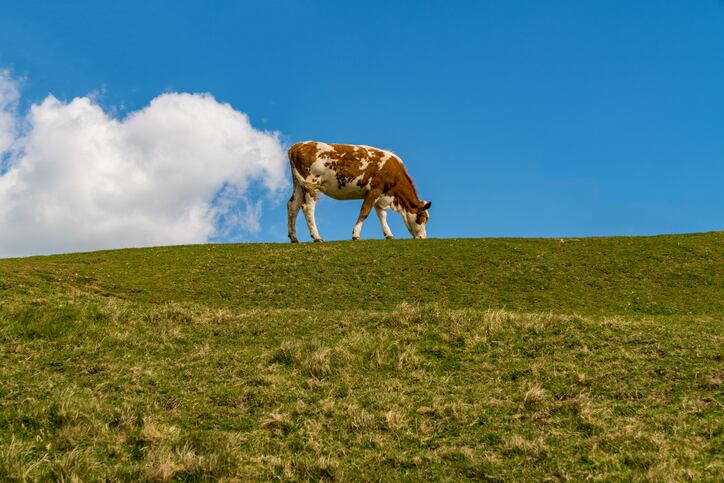The French food company and one of the world’s largest dairy companies revealed ambitious plans to reduce absolute methane emissions from its fresh milk supply chain by 30% by 2030.
Danone expects to remove 1.2 million tons carbon dioxide equivalent of methane emissions by 2030 and said it has already cut its methane emissions around 14% between 2018 to 2020.
It said it will focus on working with farmers to implement regenerative dairy practices and develop innovative solutions.
The company will also launch a partnership with Environmental Defense Fund, a global non-profit environmental organization working in nearly 30 countries. This alliance will see Danone work together in such areas as improved science, data and reporting standards, innovative financing models to help farmers of all sizes, and catalyzing industry and policy leadership through advocacy.
Methane emissions make up 25% of Danone’s full scope emissions. Fresh milk represents around 70% of Danone’s methane emissions. The remaining 30% is made up by indirect dairy ingredients.
A reduction in methane emissions will have immediate benefits for the climate that reductions in carbon dioxide cannot achieve on their own, according to the IPCC2. Dairy production from cattle makes up an estimated 8% of total human-caused methane emissions, as part of agriculture and livestock activities which represent approximately 40% of global methane emissions.
Danone works directly with 58,000 dairy farmers across 20 countries and has already supported projects for dairy farms in 14 countries, through its regenerative agriculture program, initiatives such as Farming for Generations and with Danone Ecosystem.
While these projects are holistic in nature, with benefits on biodiversity, soil quality and reduction of the use of chemicals in farming, reduction of GHG emissions - including methane - has been a priority.
The company said it will continue to accelerate efforts globally across diverse farming systems, working hand-in-hand with dairy farmer partners. It is expected to launch four new initiatives for methane reduction in Africa, Europe and the United States later this year.
Antoine de Saint-Affrique, Chief Executive Officer of Danone, said: “Dairy products are an affordable source of nutrition for many people, at the core of our mission to bring health through food. As one of the largest dairy companies, we take the challenge of both producing more [to feed a growing population] and greatly reducing emissions and impact on climate.
"Our ambitious plan to reduce methane emissions – in line with Global Methane Pledges from 150 countries – is a commitment to build regenerative dairy.
"This step change requires a collective effort. Working with farmers, partners and governments, we have the power and duty to build farming models that benefit the climate and society, taking a step forward to tackling global warming together.”
Fred Krupp, President of EDF, also a member of the Environmental Defense Fund, said: “Cutting methane emissions is one of the fastest and most effective ways to slow climate change. The dairy sector can play an important role in driving these reductions while boosting farmer livelihoods and increasing food security and nutrition.
“Danone is the first food company raising this type of ambition, but it can’t be the last. This is the decisive decade for climate action. We invite other food companies, farmers and policymakers to join us on a path toward 2030 climate results.”
Responding to the Danone’s announcement, Nusa Urbancic, Campaigns Director at the Changing Markets Foundation said: “Danone is the first dairy company to get serious about methane emissions which account for up to 70% of the sectors climate footprint. By setting a target in line with the Global Methane Pledge and committing to report methane emissions separately it is setting an example that other dairy giants such Nestlé and Arla need to follow.
“While Danone is leading the dairy sector on climate action there is no room for complacency. Its methane target only applies to fresh milk and should be extended to cover all dairy products and it needs to move more of its business towards dairy alternatives.”
“Financiers should also be putting pressure on the meat and dairy companies that they invest in. Our new report shows that investors and lenders to the 15 big meat and dairy companies – such as Vanguard and BNP Paribas - are exposed to methane emissions greater than the climate footprint of Saudi Arabia.”
Sustainability expert Mark Driscoll, the Founder and Director at Tasting the Future, also welcomed the news. “Action on methane today can make a significant and almost immediate difference in reducing the impact on GHG emissions and they have taken a leadership position as one of the first companies to commit to the recently signed Global Methane Pledge,” he told FoodNavigator.
“Most importantly they have committed to report on its methane emissions as part of its financial disclosure. They should be applauded for taking a lead and let’s hope others will follow given how important addressing emissions are to reducing climate emissions.”
The announcement came as a separate report by Planet Tracker and Changing Markets revealed the top financial institutions funding the world’s biggest methane producers, and the role they can play in ‘turning the tide on global heating’.
The report named the 20 investors and 20 banks currently financing the methane-generating activities of fifteen leading global meat and dairy companies, identified in terms of equity ownership, bond ownership and bank funding. All were found to have weak or non-existent policies for reducing methane emissions, with a particular gap regarding livestock agriculture – the single largest source of agri-methane. This conflicts with the Global Methane Pledge were signed by all but one of the institutions’ home countries, the report said.
Peter Elwin, Director of Fixed Income and Head of Food and Land Use Programme at Planet Tracker, said: “Methane is a powerful climate pollutant, 80 times worse than CO2 over a 20-year period. This report highlights the significant role that financial institutions have to play in limiting agricultural methane emissions. Food production generates more methane than the energy system so if asset managers want to achieve net zero in their portfolios, they need to address the issue of agri-methane.
“The good news is that it is comparatively short-lived – methane breaks down in the atmosphere, reducing to half its level in around 11 years. Cutting methane emissions gives financial institutions the greatest bang for their buck enabling them to rapidly reduce the GHG footprints they fund. More importantly, tackling methane emissions now will have an amplified positive impact in slowing global heating before 2050.”



